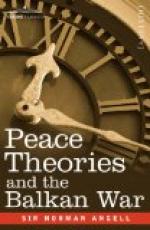The Navy League definition is at least possible of application to practical politics, because rough equality of the two parties would make attack by either dangerous. Mr. Churchill’s principle is impossible of application to practical politics, because it could only be applied by one party, and would, in the terms of the Navy League principle, deprive the other party of the right of defence. As a matter of simple fact, both the Navy League, by its demand for two ships to one, and Mr. Churchill, by his demand for certain victory, deny in this matter Germany’s right to defend herself; and such denial is bound, on the part of a people animated by like motives to ourselves, to provoke a challenge. When the Navy League says, as it does, that a self-respecting nation should not depend upon the goodwill of foreigners for its safety, but upon its own strength, it recommends Germany to maintain her efforts to arrive at some sort of equality with ourselves. When Mr. Churchill goes further and says that a nation should be so strong as to make victory over its rivals certain, he knows that if Germany were to adopt his own doctrine its inevitable outcome would be war.
The issue is plain: We get a better understanding of certain political facts in Europe, or we have war. And the Bellicist at present is resolutely opposed to such political education. And it is for that reason, not because he is asking for adequate armament, that some of the best of this country look with the deepest misgiving upon his work, and will continue to do so in increasing degree unless his policy be changed.
Now a word as to the peace Pacifist—the Pacifist sans phrases—as distinct from the military Pacifist. It is not because I am in favour of defence that I have at times with some emphasis disassociated myself from certain features and methods of the peace movement, for non-resistance is no necessary part of that movement, and, indeed, so far as I know, it is no appreciable part. It is the methods not the object or the ideals of the peace movement which I have ventured to criticize, without, I hope, offence to men whom I respect in the very highest and sincerest degree. The methods of Pacifism have in the past, to some extent at least, implied a disposition to allow easy emotion to take the place of hard thinking, good intention to stand for intellectual justification; and it is as plain as anything well can be that some of the best emotion of the world has been expended upon some of the very worst objects, and that in no field of human effort—medicine, commerce, engineering, legislation—has good intention ever been able to dispense with the necessity of knowing the how and the why.
It is not that the somewhat question-begging and emotional terminology of some Pacifists—the appeal to brotherly love and humanity—connotes things which are in themselves poor or mean (as the average Militarist would imply), but because so much of Pacifism in the past has failed to reconcile intellectually the claims of these things with what are the fundamental needs of men and to show their relation and practical application to actual problems and conditions.




